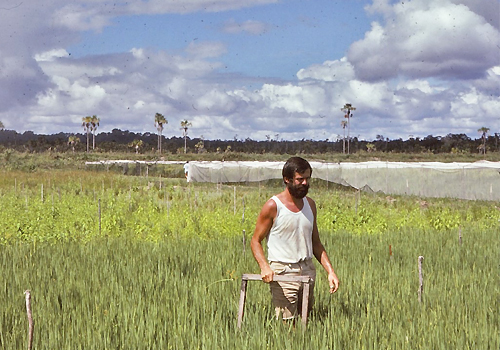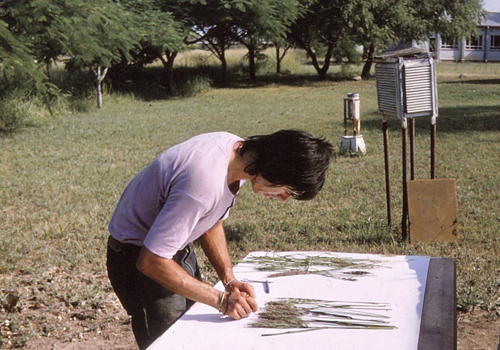In 1974, while still a PhD student, Spencer Barrett was working in the Amazon basin in Brazil, researching native plant species that threatened cultivated rice.
But his work was interrupted when he discovered a previously unknown form of water hyacinth. The naturalist Charles Darwin had predicted its existence more than a century earlier but it had remained undiscovered despite decades of searching.
“My supervisor said, ‘Drop the other research. This is big,’” says Barrett. “So I did and I’ve been working on the water hyacinth ever since.”
The water hyacinth is an incredibly harmful invasive species in part because of its ability to reproduce both by cloning itself and by producing seeds. It is just one example of the reproductive diversity of plants that fascinates Barrett, now a University Professor Emeritus in the Faculty of Arts & Science’s Department of Ecology & Evolutionary Biology (EEB).
“Biologically speaking, we humans lead pretty dull sex lives,” he says. “We all reproduce in basically the same way.
“But plants! Some clone themselves, some self-fertilize, some cross-breed. Some even produce clonal seeds — which doesn't make sense. Why go to the trouble of cloning a seed when you can skip that step and clone yourself by growing new shoots?”

As a leading authority on the reproductive biology and genetics of flowering plants, Barrett has spent his career answering questions like this. Why is there so much diversity in plant reproduction? How do plants move from one particular system of reproduction to another? Why does a plant evolve to become predominantly self-fertilizing? How and why does a plant evolve from being pollinated by insects to being pollinated by the wind?
In recognition of his achievements, Barrett has received the prestigious Darwin-Wallace Medal from the Linnean Society of London. The medal is named after Darwin and Alfred Russell Wallace who independently developed the theory of evolution by natural selection.
“I’m quite chuffed and delighted,” he says. “It’s an honour.
“I’m a great admirer of both Darwin and Wallace. In fact, Darwin started working on plants almost immediately upon returning to England after his voyage on the Beagle. He realized that plants were really good experimental organisms with which to test some of his ideas about adaptation and natural selection. He wrote numerous works on plant reproductive biology including three very important books.
“What’s more, I’m delighted to receive the honour because recipients of the medal have predominantly been zoologists,” he says. “Not many botanists have received it.”
The Linnean Society, founded in 1788, is the oldest active natural history society. According to the society, the medal recognizes individuals “for their major advances in evolutionary science and contribution to the wider natural history community.”
It was previously awarded on the 50th, 100th and 150th anniversaries of the reading at the society in 1858 of a joint paper by Darwin and Wallace on the evolution of species by natural selection. It has been awarded annually since 2010 and Barrett will receive his in an online ceremony on May 24, 2021.
“Spencer Barrett’s research group has made wide-ranging contributions to our understanding of plant reproduction, spanning ecology and evolution to genetics and genomics,” says Stephen Wright, EEB chair.
“In addition to giving us major new insights into how and why plants reproduce the way they do, he has trained and mentored a whole generation of students, who themselves have gone on to shape the field.”

Barrett adds the medal to a number of other honours. He is a Fellow of the Royal Societies of Canada and London; a Foreign Honorary Member of the American Academy of Arts and Sciences; and an international member of the U.S. National Academy of Sciences. He twice held a Canada Research Chair in evolutionary genetics.
Barrett received his B.Sc at the University of Reading in the UK. He received his PhD from the University of California Berkeley before joining U of T in 1977. He was named a University Professor in 2008.
Among Barrett’s original research findings on plants is the first experimental demonstration of the selective purging of deleterious genes following inbreeding, the first genetic estimates of effective population size, and the most comprehensive evidence for the role of genetic drift in initiating adaptive changes in mating.
He also demonstrated, for the first time, that self-fertilization has hidden costs because of lost mating opportunities through male fertility, a finding with profound implications for functional interpretation of plant reproductive traits. Barrett provided the first experimental evidence in support of the Darwinian hypothesis for the adaptive significance of tristyly — in which the reproductive organs of different plants of the same species come in three different forms — and solved the long-standing puzzle of the evolution and function of mirror-image flowers.
These contributions have rejuvenated the field of reproductive biology making it one of the most active areas within ecology and evolutionary biology. In addition to his studies on plant reproduction, Barrett is also an internationally recognized expert on the ecology and genetics of plant invasions and the environmental consequences of genetically modified crops.
The medal also recognizes Barrett’s contributions as a mentor — having supervised dozens of students over his career — and as a teacher.
From 1990 to 2018, Barrett and colleagues taught the introductory biology course, BIO 120, which won many distinctions, including the Northrop Frye Award for integrating teaching with research. Over the years, the course has introduced tens of thousands of first-year students — including Wright who now teaches it — to evolutionary biology.
“We taught the students about the story of evolution and life on Earth and about Darwin and Wallace,” says Barrett. “I’m honoured to receive a medal bearing their names.”
With files from the Linnean Society of London.

